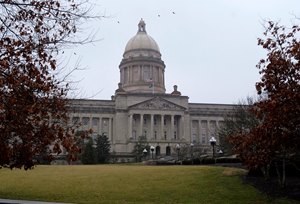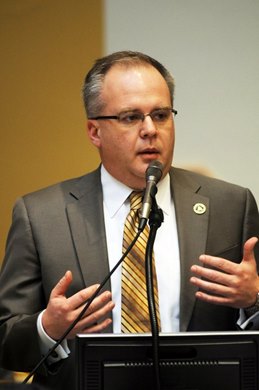Pari-Mutuel Reform Clears Kentucky House


The Kentucky House of Representatives passed a bill March 21 on a 66-29 vote that would make several reforms to pari-mutuel wagering, including implementing a standardized tax rate on all wagers and eliminating the use of "breakage" on payouts.
A spirited debate preceded the vote on House Bill 607 that would set a 1.5% tax rate on all pari-mutuel wagers, lowering the rate on live wagers from 3.5% and the rate on simulcast wagers placed in Kentucky on out-of-state races now at 3% but raise the rate on advance-deposit wagers from 0.5%. The bill also would eliminate breakage, which currently rounds off payouts to the nearest 10 cents on a $1 bet, by requiring tracks to payout to the nearest penny.
Pat Cummings, executive director with a Thoroughbred racing not-for-profit think tank called the Thoroughbred Idea Foundation, said the bill's passage is a big step toward making Thoroughbred racing in Kentucky a more competitive product despite the tax increase on ADW wagers. TIF has been advocating for breakage reform since its founding in 2018.
While the increased tax on ADW wagers does not affect what's paid out on winning bets, some horse players on social media have been unhappy with the tax increase because it potentially takes money away from ADW providers that have been able to offer rebates to the bigger players because of the low rate. With higher taxes, the rebates are likely to shrink.
"We don't know the effect of these tax rates because we don't know the number of highly rebated customers in Kentucky; these rebates are not reported anywhere," Cummings said. "But we know pricing matters and the more we can be attentive to pricing racing competitively matters. The overall take-away is: Are horse players going to be better off with the breakage provision or without? No question. With the breakage provision, it is going to be something that horse players all over who are betting on Kentucky racing will feel."
The bill's sponsor Rep. Adam Koenig (R-Erlanger) likes to use the 2018 Kentucky Derby Presented by Woodford Reserve (G1) as an example. When Justify won the Derby that year, his victory paid $7.80 on a $2 bet. If the breakage had been paid to the penny, it would have been $7.92.
"I've been very interested since last year's HHR debate in making sure the bettors are taken care of. We took care of everyone else. Everyone is getting healthy on this except for the bettors, and this is how we're going to help the bettors," Koenig said prior to the March 21 vote.

Much of the debate surrounding this bill focused on historical horse racing games, which are electronic pari-mutuel games that many legislators felt should be taxed at a higher rate as other states reportedly do with casino gaming.
"Of the exponential increase in profits they will see, none will go to the horsemen—the people who are up before dawn, feeding and washing them, grooming them, walking them—who sleep above the stalls and travel around the country with them," said Rep. Nima Kulkarni (D-Louisville) during the floor debate. "None will go to our schools, our roads, our emergency services. I will be voting no on this bill because, we as a body should be looking at ways to fairly tax HHR revenues instead of continuing to subsidize and bail out corporations with record-breaking, soaring profits. We are losing here and should stop being beholden to corporations that have not been treating us fairly or operated in good faith."
Koenig said HHR machines have already allowed Kentucky to offer some of the highest purses in the country and that growth down the road will mean more money for the state. Among the top eight U.S. racetracks ranked by 2021 average daily purse, three are in Kentucky, topped by Kentucky Downs with a six-day turf meet that averages $2,507,311 daily due to HHR revenue. Churchill Downs ranked fourth at $953,413 and Keeneland ranked sixth at $813,932.
"We believe in two or three years, when the historical horse racing facilities are more mature, that we're looking at $20 million additional in the general fund," Koenig said during a recent committee hearing. "The increase in the ADW tax from one-half to 1 1/2 percent will immediately generate $4 million a year. That's the growth area, so that will continue to go up over time."
Koenig also noted that HHR machines are taxed on total handle instead of on profits, as many other states do with casino gaming and slot machines.
Chauncey Morris, executive director for the Kentucky Thoroughbred Association/Kentucky Thoroughbred Owners and Breeders, said he appreciated legislators who understand how the increased revenue from HHR helps ensure Kentucky tracks can continue providing world-class facilities that offer the safest environment for horses and riders and how broadly the influence of unprecedented purses is felt.
"The golden years are here right now in Kentucky. We're living it, and we need to be good stewards of that," he said. "People supporting this bill see what higher purses do and how they flow through and strengthen the economy throughout the Commonwealth."
Other elements of the bill include using HHR revenue to make the Kentucky Horse Racing Commission a self-funded agency, which would save $3 million annually for the general fund. The legislation eliminates, too, a 15-cent per person assessment charged for everyone who attends a live race meet.
"When you are looking at Churchill and Keeneland, they have tickets, they have turnstiles, they know how many people come in and out every day," said Koenig. "Kentucky Downs, Ellis Park, Red Mile, Turfway, they don't have turnstiles, so they were estimating. We're taking that out because there is no way to enforce it, frankly."
The bill also will give some revenue from pari-mutuel taxes to equine programs at the University of Louisville's Equine Industry Program and equine programs offered by the University of Kentucky and Bluegrass Community and Technical College. The University of Louisville program already receives some money from the state but that contribution would increase to $850,000 if the bill becomes law. The University of Kentucky is earmarked to receive $400,000 and the Bluegrass Community College would get $250,000.
The bill now goes to the Senate for consideration.
Reporting from Jennie Rees contributed to this story.
